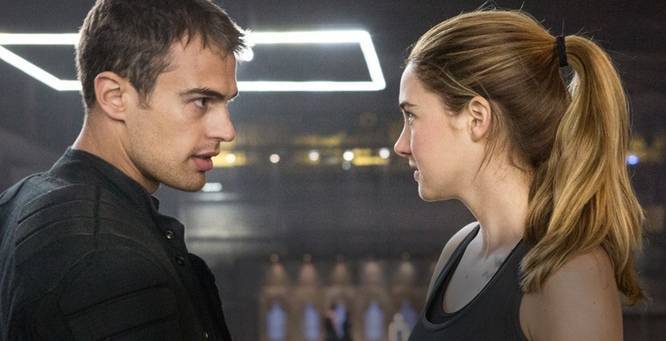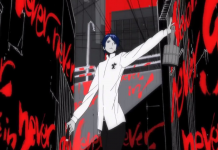*DISCLAIMER* This is my opinion. This does not reflect on anyone else on this website.
Trigger warning: sexual assault
*SPOILERS AHEAD*
It has been a week since “Divergent” hit movie theaters. Since then, the movie has gotten a mix of good and (mostly) bad reviews. I wrote one myself, talking about how the movie lacked as an adaptation and as an overall piece. One subject that I purposefully did not talk about was the attempted rape of Tris in her fear landscape.
The main reason for controversy (other than the fact that it is an attempted rape scene) is because this is not a scene in the book. In the novel, Tris does not have a fear of rape, as implied in the scene; rather, Tris’ fear is a fear of intimacy, which stems from the lack of physical contact between people in her home faction of Abnegation. In the original fear landscape, Four does not attack Tris. Tris instead looks at him and says “I will not be having sex with you in this simulation. Okay?” However, the movie scene has Four pushing Tris on the bed when she says no. He then taunts “Aren’t you a Dauntless?” and continues until Tris hits him in the groin, thus ending the simulation.
This scene has been looked at from various perspectives; some from people who have not read the books, some from people who have read the books, and some from people who have had personal accounts with rape (such as this response)
When looking at it from a survivor or victim’s perspective, the scene can come across as empowering. The scene shows a girl fighting back against her attacker, which is rare in rape scenes. Once she truly comes out of her fear landscape, people congratulate her and said she did the right thing. This can be seen as a good message to women; that your body is yours, you control it, and no one can tell you otherwise. That is a great message to send to women.
 However, it is also important to realize what else these positive messages can imply. To people who found the scene empowering because of Tris fighting back, it furthers the culture of focusing on the victim of rape rather than the attacker, which many responses to this scene have done. People who saw this scene as a good thing have said “It’s good to show a woman properly responding to an attack.” This is not a good message to be sending. Yes, it is important to teach women to fight back when under a situation such as this. However, we shouldn’t imply that women (or any victim) who did not fight back did not do the right thing. In many situations, people cannot physically fight back. Some people become paralyzed with fear and don’t act at all. This is why we shouldn’t push that mentality of Tris doing the “right thing”, or focusing on the victim at all. Society tends to focus on how the victim responded to the attack, what they were wearing, if they were drunk, etc. In the end, it is not the victim’s fault that they were raped. Rather than focus on the victim, we should focus on the attacker and what they were doing. Instead of saying “don’t get raped”, we should be saying “don’t rape.” It is strange to focus on the attacker, Four, in this situation because he is not actually doing those actions. It is a programmed simulation. The actual character of Four respects Tris’ choices and body throughout both the novel and movie. This is the right message to be sending – that you should always respect your partner’s choices and body.
However, it is also important to realize what else these positive messages can imply. To people who found the scene empowering because of Tris fighting back, it furthers the culture of focusing on the victim of rape rather than the attacker, which many responses to this scene have done. People who saw this scene as a good thing have said “It’s good to show a woman properly responding to an attack.” This is not a good message to be sending. Yes, it is important to teach women to fight back when under a situation such as this. However, we shouldn’t imply that women (or any victim) who did not fight back did not do the right thing. In many situations, people cannot physically fight back. Some people become paralyzed with fear and don’t act at all. This is why we shouldn’t push that mentality of Tris doing the “right thing”, or focusing on the victim at all. Society tends to focus on how the victim responded to the attack, what they were wearing, if they were drunk, etc. In the end, it is not the victim’s fault that they were raped. Rather than focus on the victim, we should focus on the attacker and what they were doing. Instead of saying “don’t get raped”, we should be saying “don’t rape.” It is strange to focus on the attacker, Four, in this situation because he is not actually doing those actions. It is a programmed simulation. The actual character of Four respects Tris’ choices and body throughout both the novel and movie. This is the right message to be sending – that you should always respect your partner’s choices and body.
Another issue regarding the addition of this scene is that it has no importance later in the movie. Her (new) fear of rape does not come up later; there are no further attacks or implied assaults towards her. It barely even serves as a plot device – nothing progresses due to her getting past this fear. This scene could either have been omitted completely or changed to fit the scene from the book. Rather than do that, the writers decided to throw a useless attempted rape scene that could potentially trigger people. Therefore, we can’t even argue about the use of rape as a plot device when, in fact, nothing is derived from it in terms of plot progression. (It should be noted that there is a situation where Tris is attacked in the chasm that, in the novel, involves one of her attackers groping her breasts. The groping was omitted in the movie, a good choice by the writers.)
So, what is the final verdict on the scene? Here are the pros and cons:
Pros: shows people that it is important to fight back when attacked if possible. Also promotes the idea of being in control of your body despite what other people say.
Cons: adds a potentially triggering scene in the movie for barely any plot progression. Confuses the fear of intimacy with fear of sexual assault when they are not, in fact, the same. Promotes the idea that women did not do the right thing if they did not fight back. Uses a rape scene to heighten dramatic tension.
In the end, the scene has more cons than pros. There are too many negatives in terms of contribution to rape culture and the idea of what a woman should do. Rather than go with the original scene in the novel (which would have worked, since they added Tris saying “I don’t want to go too fast” after her and Four kiss for the first time), they added a scary rape scene purely to heighten the tension and make the movie more dramatic. This scene was pointless, confusing, and empowering in all of the wrong ways, no matter what perspective you look at it from.




